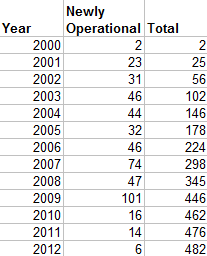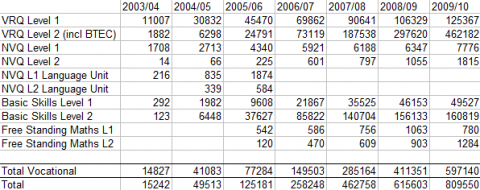Has there been a 40-fold increase in the number of vocational qualifications?
"The number of vocational qualifications has increased 40-fold in the last five or six years"
Professor Alison Wolf, Today, BBC Radio 4
The Department for Education has today announced they are to reduce the number of qualifications treated as being equivalent to GCSEs to just 125, following the recommendations of the Wolf Report in 2011.
Whilst being interviewed about the changes on the Today Programme on BBC Radio 4, Professor Wolf suggested that, in the last five or six years, there has been a 40-fold increase in the number of vocational qualifications.
Join 72,953 people who trust us to check the facts
Sign up to get weekly updates on politics, immigration, health and more.
Subscribe to weekly email newsletters from Full Fact for updates on politics, immigration, health and more. Our fact checks are free to read but not to produce, so you will also get occasional emails about fundraising and other ways you can help. You can unsubscribe at any time. For more information about how we use your data see our Privacy Policy.
Full Fact decided to find out where this figure comes from.
Analysis
The claim depends on the definition of 'qualifications'. The regulator Ofqual provides information on all qualifications, which includes the date at which the qualification became operational. This can be used to provide a breakdown of the number of qualifications introduced in each year, and a running total of qualifications.

(This table has been adjusted to take into account qualifications which are no longer operational as of 2010)
This does not take into account qualifications which became operational before 2000, but appears to show the number of National Vocational Qualifications (NVQs) and Vocationally-Related Qualifications (VRQs) doubled between 2006 and 2012.
Full Fact has contacted Professor Wolf, who has confirmed that she was referring to the number of qualifications awarded (or attainments) rather than the number available. Her report provides data for this in table 4 on page 47, sourced from the Department for Education.
The report lists the number of qualifications awarded in each category, specifically excluding GCSEs and GNVQs (General National Vocational Qualifications). The figures show that there was a dramatic increase in the number of NVQs and VRQs awarded, such that the figure for 2009/10 is 40.3× the figure for 2003/04. Basic Skills and Free Standing Maths are not treated as vocational qualifications in this calculation.

The GNVQ has been abolished, and therefore this may account for some of the increase in vocational qualifications being awarded. However, the limited contribution the GNVQ has made to the number of GCSE-equivalent 5 A* - C grades awarded (noted in the Wolf Report) suggests its inclusion would not have a significant impact.
Conclusion
The claim that vocational qualifications have increased may need to be amended to specify vocational qualifications awarded as opposed to qualifications available, but the claim appears to be broadly true — the number of NVQs and VRQs awarded in 2009/10 is 40.3× the number awarded in 2003/04.
However, this does not take into account the number of GNVQs awarded in previous years, although this is not likely to have a significant impact on the results.
Update (22/02/2012): A reader has contacted Full Fact about the effects of not including GNVQs in the calculation. GNVQs were phased-out at the beginning of the last decade, but it was pointed out that figures from the Department for Education appear to show that 91,768 GNVQs were awarded to 15 year old pupils in 2002/2003.
It is likely that many of these qualifications will have since been replaced with other vocational qualifications, and so there will have been a smaller increase in the number of qualifications available. The number of vocational qualifications awarded in 2009/2010 (597,140) is 6.5 times the number of GNVQs awarded in 2002/2003, although this does not take into account other vocational qualifications that year.
It was also noted that GNVQs were larger qualifications which took longer to teach. This may have some impact on the increase of vocational qualifications when the GNVQ was abolished, although the original claim only refers to the number of qualifications, not the time required to teach them.